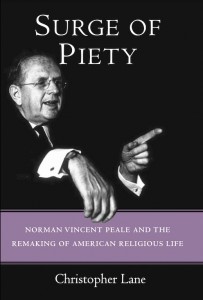“Surge of Piety: Norman Vincent Peale and the Remaking of American Religious Life” by Christopher Lane
How did Norman Vincent Peale’s blockbuster bestseller The Power of Positive Thinking capture the hearts and minds of millions of Americans, reshaping the nation’s spiritual landscape?
What role did Peale play in fueling the massive rise of religiosity in the United States during the 1950s?
How did the intersection of faith and positive psychology shape American culture and society in the mid-20th century?
The dramatic untold story of how Norman Vincent Peale and a handful of conservative allies fueled the massive rise of religiosity in the United States in the 1950s.
“Enthralling … graceful and well-paced … Requisite reading”— Washington Post
Excerpt
Read “Unholy Influence: The Success Gospel of Norman Vincent Peale and Donald Trump,” first published in The Daily Beast.
Description
How did Norman Vincent Peale’s blockbuster bestseller The Power of Positive Thinking capture the hearts and minds of millions of Americans, reshaping the nation’s spiritual landscape?
Near the height of Cold War hysteria, when the threat of all-out nuclear war felt real and perilous, the American minister Norman Vincent Peale published The Power of Positive Thinking. Selling millions of copies worldwide, the book offered a gospel of self-assurance in an age of mass anxiety.
Despite Peale’s success and his ties to powerful conservatives such as Dwight D. Eisenhower, J. Edgar Hoover, and Joseph McCarthy, the full story of his movement has never been told. Surge of Piety shows how the famed minister’s brand of Christian psychology inflamed the nation’s religious revival by promoting the concept that belief in God was essential to the health and harmony of all Americans. We learn in vivid detail how Peale and his powerful supporters orchestrated major changes in a nation newly defined as living “under God.” This blurring of the lines between religion and medicine reshaped religion as we know it in the twentieth and twenty-first centuries.
Reviews
“… contains impressive archival research on Peale’s relationship with Blanton, and on Blanton’s relationship with Sigmund Freud.”— Wall Street Journal
“develops a close portrait of Norman Vincent Peale’s effort to propel his particular brand of religio-psychiatry into the heart of the U.S. imagination.”— American Literary History
“… tells the story of Peale’s rise and fall crisply and without malice, even when Peale is at his more-huckster-than-minister gauchest”— Booklist
“impressive archival research … thoughtful … interesting ….”— CHOICE
“Peale developed a popular theology that fused American business-speak with Christianity, psychoanalysis, and political conservatism, with considerable long-term success…. Thanks to … Surge of Piety, we have a little perspective on what Peale’s philosophy meant for America, and, by extension, for Trump.”— Washington Monthly
“Now that one of Peale’s disciples sits in the Oval Office, there couldn’t be a better time for the publication of Surge of Piety: Norman Vincent Peale and the Remaking of American Religious Life.”— The Gospel Coalition
“fascinating and accessible …”— Darren Dochuk, University of Notre Dame
“masterfully shows why we cannot make sense of the tremendous mid-century upsurge in American religiosity without understanding the inimitable Peale.”— Matthew Avery Sutton, author of American Apocalypse: A History of Modern Evangelicalism
“ably shows the ways in which Norman Vincent Peale’s potent combination of Protestant Christianity, popular psychiatry, and nationalist politics helped remake America.”— Kevin M. Kruse, author of One Nation Under God: How Corporate America Invented Christian America



